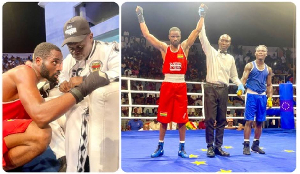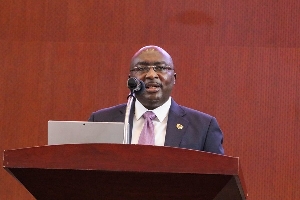- Home - News
- TWI News | TV
- Polls
- Year In Review
- News Archive
- Crime & Punishment
- Politics
- Regional
- Editorial
- Health
- Ghanaians Abroad
- Tabloid
- Africa
- Religion
- Election 2020
- Coronavirus
- News Videos | TV
- Photo Archives
- News Headlines
- Press Release
Opinions of Sunday, 16 September 2007
Columnist: Adu, Ernest Kofi
Ghana's Prisons are human warehouses
Crime is still an ever-present occurrence in Ghana in spite of ongoing efforts to climb down criminals and improve human and social security of this country’s citizens.
This is because the country’s prison facilities where criminality is expected to end have become revolving doors, and that too many of their residents – that is prisoners – return time and again; more than half of all inmates will be back in prison within six years of their release, my investigations have revealed.
As sad but unfortunately, the current 47 prison facilities across the country, whatever form they take, do not seem to correct, rehabilitate or treat criminal offenders to become useful citizens at the end of their jail terms.
They rather make them more embittered because of degrading human conditions such as lack of food, water, clothing, medicals and detergents inmates face day after day, there by serving as outdated warehouses for real human beings who have been detained by the state.
Under chapter five of the 1992 Constitution entitled “Fundamental Human Rights and Freedoms”, citizens are protected against abuse of basic human dignity, including any cruel, inhuman or degrading treatment that is “likely to detract from dignity and worth.”
However, prisons in the country are overcrowded and seen as bitter penal institutions meant for social outcasts whom government believes should just be taken away from society and given the “just deserts” for their crimes.
This is against the backdrop that government’s attention to the welfare of both prison officers and inmates is insignificant, leaving conditions at a deplorable state and weaken morale of officers of this paramilitary institution. The Ministry of Interior responsible for the Ghana Prison Service provides 4,000 as feeding money to inmates a day.
Officers are also compelled to buy their own uniforms in town because the State has consistently failed to provide for them, making each person’s uniform different from another in terms of colours. This situation has sought to compound their predicament and demoralization apart from the inadequate accommodation facilities and lack of operational vehicles and resources to run the service.
In this sense, prison success would be measured by factors such as physical security, lengthy of incapacitation, relationship between crime rate and the number of incarcerated felons, and inmates’ perception that their treatment was fair and proportionate, experts say.
But the question arising out of this situation is whether it is realistic to expect that a significant portion of prisoners will successfully adjust to society after a lengthy stay in an overcrowded and bitter penal institution of the state. Deputy Director of Prisons at the Kumasi Central Prison, Mr. A. I. Salifu in response said the nation could weed off a significant number of criminals from society only when government deems it necessary to see to the welfare of inmates properly with the intension of reforming them to become assets, not liabilities.
According to him, the onus lies on government to ensure that persons detained by the state are properly taken care of for an eventual reformation, contrary to which will mean that the state is just “throwing or keeping people in human warehouse.”
He strongly believed that the fundamental human rights of prisoners are in breach because inmates sleep in turns, have no food to eat, lack medical treatment, clothing and recreational facilities to enjoy alongside other deprivations. In the view of Mr. Salifu, the country’s prisons can be useful places for criminal offenders’ rehabilitation and treatment by offering educational programmes to inmates in order to get vocational training and college credits whiles they are serving their jail terms.
“Children have right to their birth but lack the strength to be given birth to”, he philosophically stated in answer to a question that whether the nation’s prisons are really houses of correction.
As of September 29, 2006, total prison population of inmates in the country stood at 12, 736 against official capacity of 8,004 with 3,694 being remand prisoners alone. The Ashanti Region, which has six prison establishments at Kumasi, Adansi-Ahinsan, Obuasi and Akrofrom by the end of August this year had recorded 2,229 populations of inmates against their official capacities, thereby forcing inmates to sleep in turns as pointed out by officialdom.
All these places, my investigations discovered that remand prisoners who are waiting for their trials had swelled up the number to cause the serious congestion there because police investigators handling their cases have failed in their duty to take them back to court after expiration of their warrants.
Even though the situation subsists throughout our prison facilities, the police service says it is not true because the service has specific instructions making it mandatory for police investigators to take to court for a trial or renewal of warrants of all pre-trial detainees as prescribed by law.
Inspector Mohammed Tanko, Public Relations Officer for the Ashanti Regional Police Command said it would be erroneous for such a situation to occur because “it is a chargeable offence against any police detective who will fail in his or her duty.” According to him, the long stay of pre-trial detainees at prison is not the making of the police, but the courts which have mandate to grant bail or commit a person into remand.
Equally he noted that at certain times too remand prisoners are not able to pay bill bonds or have someone to stand as surety for them thereby leading to their continuous stay in prison.
He believed a remand prisoner could appeal to his or her longer stay in prison if the one considers it an injustice and abuse of fundamental human rights, and intimated that the prisoner should not under any circumstances suffer as a result of police equally important engagements.
Mr. Tanko agreed that all efforts must be made to create humane standards in Ghanaian penal system, but pointed out that, that is a course for prison officers to champion and not the police. And I want to say that the police cannot be blameless for this abuse of human rights; commanding officers are equally guilty.
As a human rights activist, it is instructive for me to point out that degrading conditions and brutal punishment of criminals by the state are not dissimilar from the very act committed by criminal offenders, therefore, the time has come for the country’s correctional facilities ought to be made correction-oriented in order to achieve the objective of disciplining the offender psychologically.
The original legal punishments, according to history and study, were typically banishment or slavery, restitution, corporal punishment and execution. The concept of incarcerating convicted offenders for long period of time as a punishment began in the nineteenth century.
Imprisonment has now evolved to be correctional measure instead of punishment in attempt to rehabilitate those who cannot manage their lives and the state has to take responsibility. It is better pay now than later.











